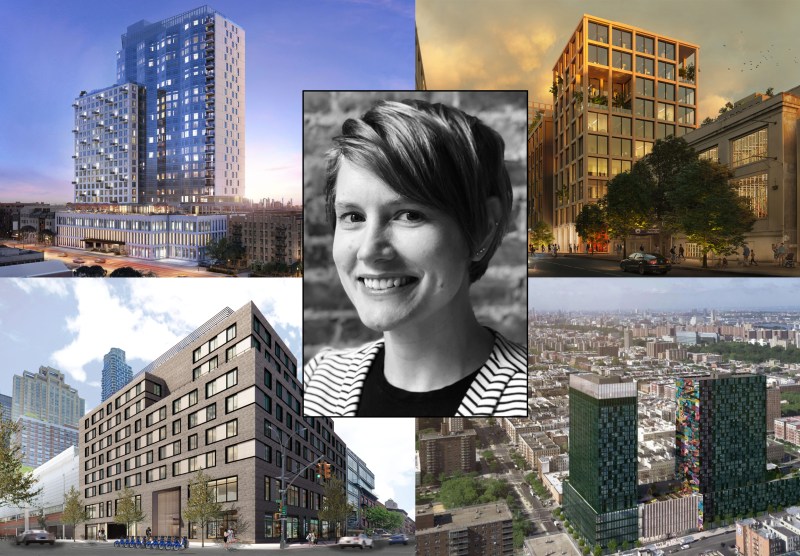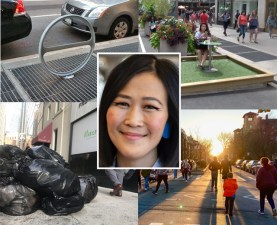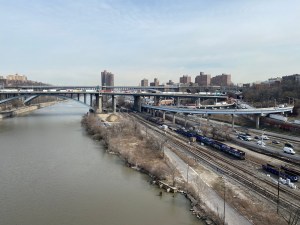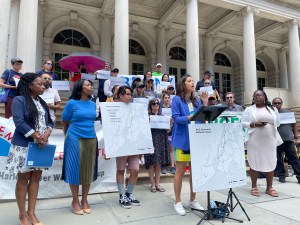City Hall Land Use Honcho Heads to Advocacy Sector to Get Transportation-Oriented Stuff Done

The Adams administration’s senior adviser for land use, Annemarie Gray, has quit her lofty City Hall perch to head to the advocacy sector to run an organization at the forefront of fighting for building more housing across the city — with a focus around transportation.
Gray, who also worked in the prior administration, revealed on Monday that she had joined Open New York, which has lustfully supported development projects the SoHo/NoHo rezoning, The Lirio in Hells Kitchen and Bruckner Boulevard in the Bronx, as well as contentious policy changes like fighting to do away with antiquated zoning rules that force developers to include a certain number of parking spaces in new developments.
Streetsblog’s Julianne Cuba chatted with Gray about housing and transportation policy and how the two are intimately intertwined; and what she hopes to bring to the conversation and table in order to build more transit-focused housing across the five boroughs.
I’m excited to share that I will be joining @OpenNYForAll as its new Executive Director.
I can't wait to get to work and push for the solutions we need to fight New York’s housing crisis alongside this amazing, woman-led leadership team.
Why this is such an exciting moment ?
— Annemarie Gray (@annemariegray) September 19, 2022
Julianne Cuba: What are you most proud of during your few years at City Hall, and what are you looking to bring with you from your work there, or leave behind?
Annemarie Gray: I’ve worked on a lot of projects that really advanced the conversation around housing and how we develop our city more equitably. The Soho and Gowanus (rezonings) I worked on, making the Open Restaurants program permanent and then a lot setting up this new administration.
I care deeply and have focused my whole career on these issues. I’m really excited with everything I’ve learned. I really feel the biggest challenge right now is the political environment and lack of a broader coalition that can really put stronger pressure on elected officials and be able to pass more ambitious city and state policies that we really need in order to address the housing crisis on the scale that it’s needed.
To me, housing policy is also transportation policy. I think you really can’t separate the two. I really feel like everything we’re doing to try to build more housing in the smartest ways helps with our transportation problems as well.
JC: What are some of the initiatives you want to jump right into? What policy changes do you want to make, or pieces of legislation you want to pass at the city and state level?
AG: On the city side, there’s a lot of more neighborhood-specific advocacy that the group is known for that we will definitely keep doing. There’s some really exciting things that the city is starting to undertake and we will want to be heavily involved in that, that can really help bring more housing, especially around transit and just in a lot of places where it really makes sense and the same with on the state level.
JC: Do you see the city or state wholesale eliminating parking minimums anytime soon, like they already have in places like Buffalo, San Francisco, and Minneapolis?
AG: The issue of parking minimums being talked about on the city scale, and as well as some of the state is one of the issues we’re definitely gonna be focusing on. Transportation and housing policy are really one and the same.
JC: What’s your take on two recent controversial rezonings that have been opposed by the local council members there, like Bruckner Boulevard in the Bronx and One45 in Harlem?
AG: There’s so many examples of projects recently where it’s clear there’s a lot of folks saying building more housing shouldn’t be that controversial but we don’t have the full coalition or the political environment for a lot of these projects to pass. And I really think Open New York has been on the frontlines trying to change the narrative of a lot of these projects and change the terms of the debate so we have an environment where a whole set of projects and policies can move forward differently than ways we’re seeing today.
JC: How would you respond to some of the arguments against allowing for such development in communities like Harlem where the council member is worried about gentrification?
AG: I think especially in some of the neighborhoods where there’s particularly few low-rent low-cost housing options for people, which has been a lot of Open New York’s focus, it’s important to point out how housing touches every single issue and a big tent coalition really helps start to build a stronger movement. These are issues that really have to do with homelessness, climate change, and transportation. There are so many people impacted by the system not working today and have a lot to gain and I think there’s a lot of work to build up a stronger and more vocal counter force to some of what we’re seeing in certain circumstances.
Some of the projects like the ones you mentioned, we have some structures in place that allow a small but vocal minority to sometimes weaponize the projects that I think a lot of folks recognize shouldn’t be controversial.
JC: So are Harlem Council Member Kristin Richardson Jordan, who opposed One45, and Bronx Council Member Marjorie Velázquez, wrong for taking the positions they have?
AG: I can’t speak to specific projects. Similar to what I said before, personally and with Open New York I’m just really excited because I think a coalition and changing the political environment can get more projects that people want across the finish line.
JC: Will Open New York team up with transportation advocates looking to reimagine the Cross Bronx and Brooklyn-Queens Expressways?
AG: The core drive for the organization is really furthering the progressive approach to housing, including creating all forms of it and really recognizing and pointing out how housing touches every single issue. So I think over the longer term we want to be in alliance with more transportation-centric projects that have a lot of overlap and I’m excited to meet some more of the people fighting that. There’s so many different issues that are relevant, I’m excited as I get up to speed into the role to understand where the best intersections are and where the best partnerships are.
This interview has been edited for length and clarity.



